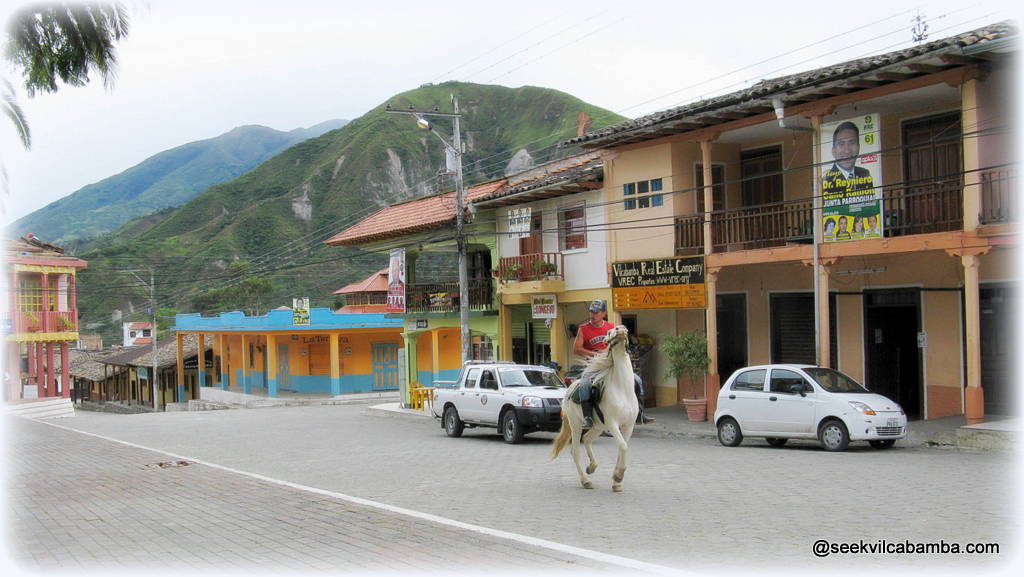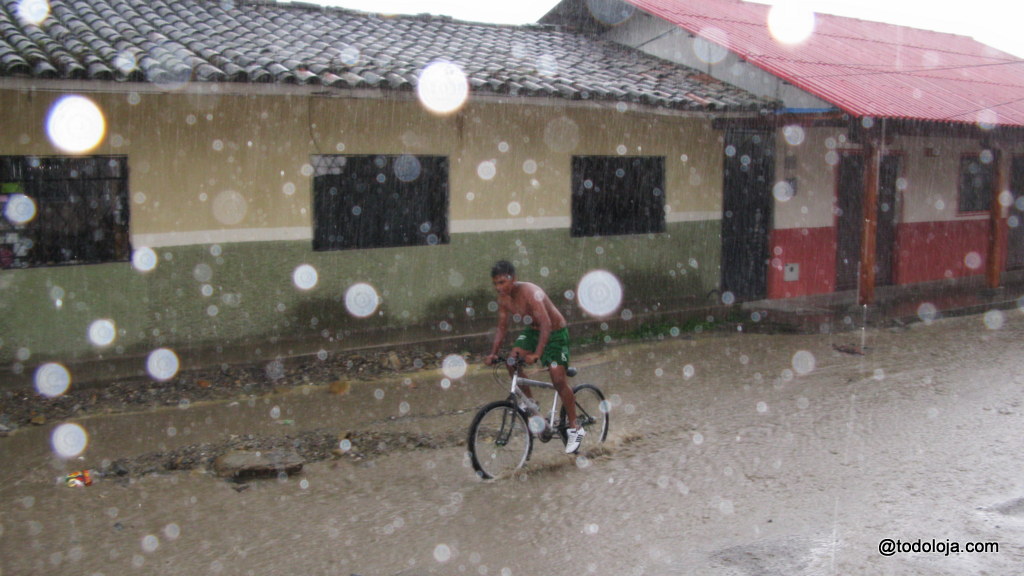
Nota sobre el castellano.
 Todas las páginas de esta guía aun no están traducidas al inglés. Sin embargo cuando se encuentre una pagina en inglés, es siempre posible activar la traducción automática Google con el botón de idiomas
arriba seleccionando Español en la lista de idiomas.
Todas las páginas de esta guía aun no están traducidas al inglés. Sin embargo cuando se encuentre una pagina en inglés, es siempre posible activar la traducción automática Google con el botón de idiomas
arriba seleccionando Español en la lista de idiomas.
Introduction
by Anita Evans
The information contained in this guide is a mixture of my own personal experiences, internet sources (only
used if name of author is available), interviews with business proprietors and feedback
from clients of the businesses.
This guide also contains opinions. We are open to constructive comments and suggestions and invite you to tell us
of your experiences at businesses in Vilcabamba so that we may keep this guide
up to date. Please provide: your name and contact details and the name and contact
details for the business you are referring too.
Any prices quoted in the guide are approximate only. They are subject to change
at any time.
If you wish to send feedback please do so through the contact page.
Opening Hours:
Where possible I have included the hours that a business is open. Please note that
most places (except food places) close for lunch between 12:30 ish and 2:30 ish.
This is especially applicable for businesses in Loja. Some food places will close
in the afternoon then reopen early evening. Monday sees a lot of food places and
other business closed.
Now, if you find that the place is closed when I say that it should be open, don't
blame me and welcome to Latin America! Sometimes restaurants close for no reason
(maybe the owner does not feel well). If you find that my opening hours info is
completely wrong, please drop me an email using our feedback form and I will endeavour
to correct my mistakes.
Como consultar
Si usted esta viendo este sitio en una computadora de escritorio o una portátil, el "Menú Árbol" a la derecha le dara la opciones disponibles.
Si usted esta viendo este sitio en un tablet o un smart, el botón "Menú Árbol" abrirá la ventana del "Menú Árbol"
que le permitirá hacer su selección.
Below is a short intro to each section in this guide. If you click on the titles,
you will be taken to that particular section.
Eating Out
For a small town/village, Vilcabamba has an abundance of superb and diverse restaurants.
A number of places will serve a ‘menu de hoy’ (menu of the day). This usually (but
is not always the case) consists of a drink of juice, a soup and a main. Sometimes
a light fresh fruit desert will be included. The ‘menu de hoy’ is usually
very well priced and more local cuisine.
Also, most restaurants don’t start serving until noon and stay open late into the
evening.
Also, most restaurants have a vegetarian section on their menu but there is one
fully vegetarian restaurant in Vilcabamba at this time.
Where to Stay
For a pueblo of this size, Vilcabamba offers a range of places, each varying in
style and price, and some of the most scenic and interesting places lie just a short
distance (a few kilometers) outside of the town itself. Depending on your tastes
and wallet size, you can choose from options as diverse as pampering yourself in
a spa to pitching in on a working farm.
What to Do
It is not feasible for me to experience every activity here. For one, I’m too old
for some of them and my body will protest no end if I push it. Having a young family
means I’m a little time strapped. Okay, I admit it I’m not one of these supermoms
and don’t strive to be.
So, I invite you to tell me of your experience of any activity you have done in
Vilcabamba. Please provide the name of the activity operators and contact details
for them.
Services
This section covers medical, police, non retail/food business, post (mail), taxis,
translators etc.
Odds and Ends
This section covers topics like water, loo (BTW for US citizens a "loo" is a toilet,
I am a Kiwi and "loo" sounds so much better) paper, money, fruit, insects and animals.
General stuff that you need to know about life here in Vilcabamba.
Neighbouring towns
There are a number of places to explore around Vilcabamba and I have by no means explored them all. This section covers the places that we have been able to get to.
Calendario
The best time to visit depends on you and your needs: whether you want to party
hard or have peace and quiet, whether you love or hate the rain etc..
- New Years Eve sees the town packed to celebrate bringing in the New Year. What they
do here is create dummies from old clothes, plastic etc and set them on fire on
New Years Eve, which is all good bar the smell of burning plastic.
- February is carnival time! Carnival generally occurs around mid Feb. It lasts for
about a week starting around Wednesday. By Saturday Vilcabamba Parque Central has
become a big mosh pit. With people dancing shoulder to shoulder and covering each
other with foam, flour and eggs. The week after carnival finds the town in clean
up and recovery mode.
- Easter the celebrations are more religious focused and last for the weekend of Easter.
-
July to the second week of September is the summer holidays in Ecuador. Schools
are closed and people take vacations. Vilcabamba is a ‘vacation town'. This sees
it growing to bursting point on the weekends during the holidays especially if something
is on. Last weekend (31 Jul/1 Aug 2010) there was a football event at the local
stadium and the town was packed, though by no means as packed as at Carnival time.
There are festivals celebrating the anniversary of each pueblo during these months
too.
- July and August: there are festivals celebrating the anniversary of each pueblo
during these months. For Vilca given it is the biggest in the area the festival
runs for two weeks and incorporates local arts, dance, a rodeo and local football
competition
High Season – Low Season
High Season runs from August to February and Low Season from March to July, or so
I have been told.
By the way, there are only 2 seasons in Ecuador: the dry season and the rainy season.
When it rains here, it rains a lot and the kids love it (see below)!
However, as wet as 2009 was, 2010 on the other hand hardly saw any rain at all.

Public Holidays in Ecuador
Source:www.ecuadortravelsite.org/public_holidays.html
Ecuador's public holidays mostly celebrate historic events and religious festivals. Some public holidays are national and apply to the whole of Ecuador, some are local to a particular city. A public or bank holiday may be applied on a Friday if the actual date falls at the weekend or midweek. In this case it is common for festivities to happen on the actual date and then people have the day off on the official date anyway, thus getting two holidays for the price of one.
Some celebrations are not actually public holidays, but the public stop working and celebrate anyway and there is very little that the government can do about it. In general, if there is an excuse for a party, people in Ecuador will celebrate it.
National Public Holidays in Ecuador
- Regional Public Holidays, or Festivals not officially Public Holidays but widely celebrated anyway
- February/March - Carnival (Carnaval, just before Lent) Dates vary, in
2010 Carnival public holidays are 15 & 16 February, but workers
must compensate by working 2 Saturdays in March. Carnaval involves
flinging water and/or flour at everyone, including total strangers and
tourists with expensive cameras - be warned. Throwing water in through
the windows of moving vehicles is not outside the rules either.
- March/April - Easter (Semana Santa, literally Holy Week). Dates vary,
Good Friday is 2 April in 2010. Holy (Maundy) Thursday (Jueves Santo)
is widely celebrated, but the official public holiday is Good Friday
(Viernes Santo). The parade in Quito´s Old Town attracts large crowds
as the cross is carried past the old colonial churches.
- 1 May - Labour Day (Dia del Trabajo)
- 24 May - Battle of Pichincha (Batalla del Pichincha)
- 24 July Birthday of Simón Bolivar (Nacimiento de Bolívar)
- 10 August - Independence Day (Primer Grito de Independencia)
- 9 October - Independence of Guayaquil (Guayaquil only) (Independencia
de Guayaquil) Usually celebrated in Guayaquil with a parade.
- 2 November - Day of the Dead, or All Souls´Day (Día de los Difuntos)
Families visit cemeteries and leave offerings of bread figurines for
deceased relatives. The traditional food at this time is bread babies
(guaguas de pan) and a purple drink (colada morada).
- 3 November - Independence of Cuenca (Independencia de Cuenca)
- 6 December - Foundation of Quito (Quito only) (known as "las fiestas de
Quito") with parades, parties and bullfights in Quito. Effectively
marks the beginning of Christmas for most Quiteños, many of whom put up
Christmas trees as well as the Quito flag.
- 25 December - Christmas Day (Navidad) The present-giving and Christmas
dinner actually take place at midnight on 24th December (the "noche
buena" or good night, so the 25th is usually spent recovering.
- 31 December - New Year´s Eve (Nochevieja, literally "old night", or Fin
de Año, end of year) when symbolic figures of the old year are burnt to
signify a fresh start to the new year. Also expect lots of fireworks.
- 1 January - New Year (Año Nuevo)
Public holidays in Ecuador are often celebrated with family, which for
many people means travelling back to their home town or village.
Consequently buses are often packed around these dates, so either try
to avoid travelling around public holiday dates, if possible, or else
reserve a ticket ahead of time.